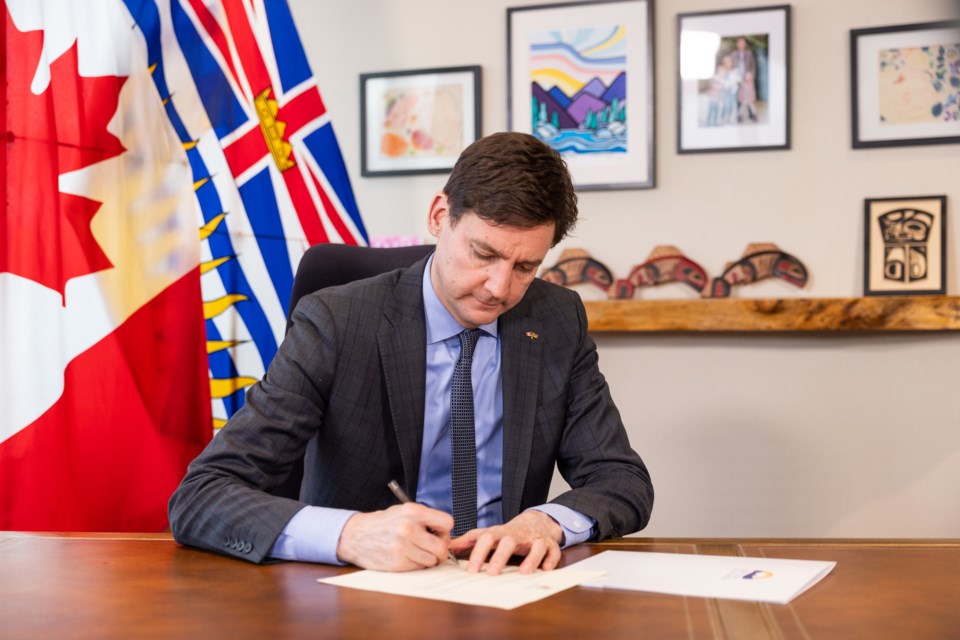British Columbia began pulling American alcohol from government liquor stores Sunday in a show of defiance against punishing new tariffs levelled against Canada by U.S. President Donald Trump.
Housing Minister Ravi Kahlon, who is chair of the premier’s cabinet war room on tariffs, pitched in at a BC Liquor store in Vancouver’s South Cambie neighbourhood, where staff were removing alcohol from Republican states. That included Jack Daniels (from Tennessee), Bacardi Rum (from Florida), Titos Vodka (from Texas), as well as Jim Beam and Bulleit Bourbon (from Kentucky).
“No one wants to be here,” Kahlon said to reporters. “This is completely avoidable. Yet we are here and we are going to respond.
“For some people in the U.S., perhaps Donald Trump, they took our kindness for weakness,” said Kahlon. “And we do love our American cousins, but we will not stand by for this type of action.”
It was an immediate, but largely symbolic, move by the province. You could liken it to a mosquito biting an elephant — it’s unlikely the world’s greatest economic superpower will even notice the annoyance.
From here on out, the choices on how to respond become more difficult for Premier David Eby’s government. In some cases they’ll require a major realignment of the BC NDP’s political attitude.
Look no further than another plank of the government’s response, to fast-track 10 natural resource projects.
On the one hand, these new projects will generate $20 billion in economic activity, 6,000 jobs and soften what’s expected to be a recession caused by the American tariffs. On the other, some stand to be deeply unpopular amongst environmentally minded New Democrats for whom climate change, not tariffs, is the greatest threat to the future.
The new projects include mining, which can have an ugly impact on the landscape and is a sensitive issue for a province only 10 years removed from the Mount Polley mine disaster in the Cariboo region. Others include natural gas development, which has been the equivalent of a four-letter word inside the NDP caucus for years, and a matter of much scorn amongst members of the NDP’s various municipal farm teams who’ve been trying to ban natural gas hookups to homes and businesses.
“We've identified 10 projects that we believe can be moved along quite quickly and get shovels in the ground, get people hired around construction,” said Eby.
“There's energy projects, there's mining projects. And these are particularly projects that are in smaller, rural and remote communities that are going to be disproportionately affected by these tariffs.”
It’s a big step out of the comfort zone for an NDP government that in 2017 could barely bring itself to stomach the idea of a Site C hydroelectric dam in the Peace Region because it ruined agricultural land used to grow watermelons.
But they say extraordinary times require extraordinary measures. And so begins the extraordinary alterations to what the NDP now considers acceptable.
The NDP would not provide a list of the 10 projects, perhaps intending to parcel them out as individual announcements in the coming weeks to maximize their political impact.
But those 10 are just the beginning, said Eby, who has tapped his leaders from labour, business and industry on his tariff task force to identify more projects to boost the economy.
That new list should include the $18-billion second phase of LNG Canada’s export terminal in Kitimat, said Opposition BC Conservative Leader John Rustad.
“We need to focus on getting LNG Canada phase two going as quickly as possible,” he said in a video posted to social media Sunday.
New Democrats have never been enthusiastic supporters of LNG export terminals or the controversial pipelines like Coastal GasLink that are required to get the natural gas from the north to the B.C. coast.
But the Trump tariffs have reaffirmed the need to diversify provincial trade, said Eby. Natural gas is our single largest export to the United States, worth $4.8 billion in 2023. If we can’t sell it there, we’ll have to liquefy it, load it into tankers and ship it to customers in Asian markets.
LNG Canada helps fit that bill on a massive scale. The NDP in the past have all but demanded phase two use electricity for liquefaction, and wait until BC Hydro builds the required new capacity. Perhaps that political math is changing in the wake of Trump. Perhaps it’s more important to get it going as quickly as possible, even if it blows a hole in B.C.’s climate plan.
Those are the kind of difficult decisions that await the B.C. government, as it lurches into the great unknown world of American tariffs, and tries to make the best out of a difficult situation.
Rob Shaw has spent more than 17 years covering B.C. politics, now reporting for CHEK News and writing for Glacier Media. He is the co-author of the national bestselling book A Matter of Confidence, host of the weekly podcast Political Capital, and a regular guest on CBC Radio.




